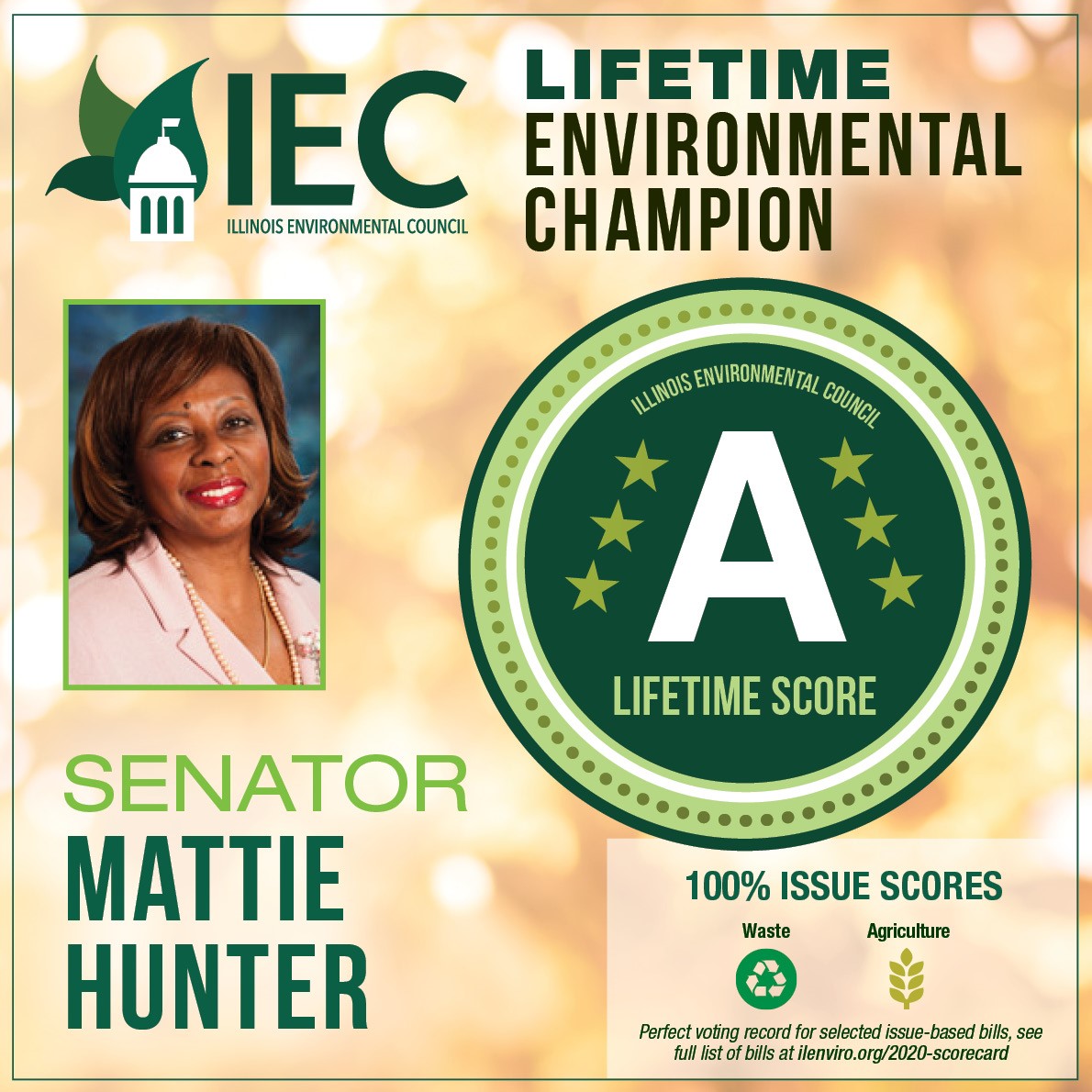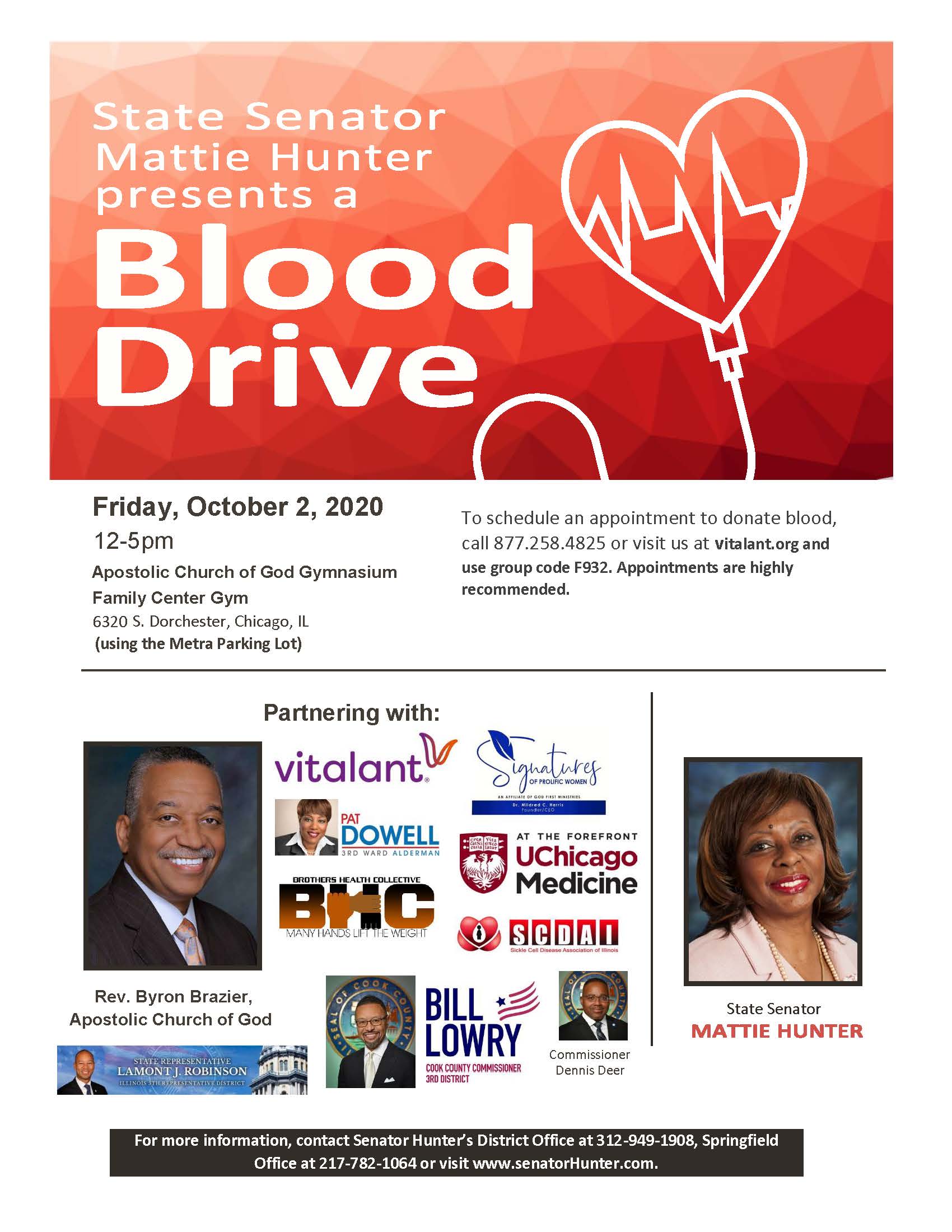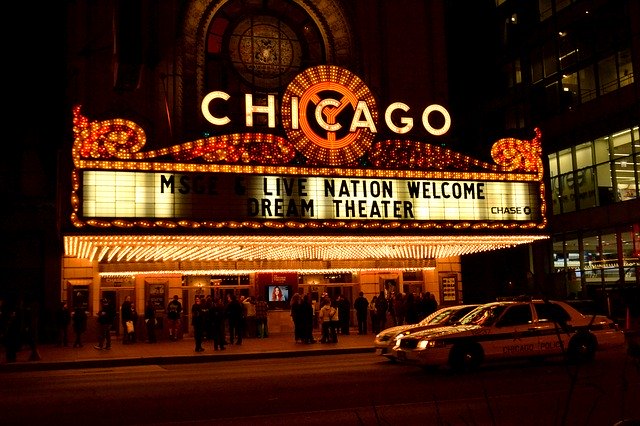Hunter honored as environmental champion
- Details
- Category: Press Releases
 CHICAGO — The Illinois Environmental Council (IEC) released its first ever Lifetime Environmental Scorecard, which reveals each sitting legislator’s lifetime average score of all votes cast on bills affecting the environment in the General Assembly over the course of their entire legislative career. State Senator Mattie Hunter (D-Chicago) has been honored with a lifetime environmental score of 90.1%.
CHICAGO — The Illinois Environmental Council (IEC) released its first ever Lifetime Environmental Scorecard, which reveals each sitting legislator’s lifetime average score of all votes cast on bills affecting the environment in the General Assembly over the course of their entire legislative career. State Senator Mattie Hunter (D-Chicago) has been honored with a lifetime environmental score of 90.1%.
“My voting record on environmental issues reflects where I stand on the importance of taking action on climate change, fighting for clean air and water, and protecting our open spaces,” said Hunter. “I stand with the Illinois Environmental Council in making it a priority to protect our environment and the health and safety of the communities I represent in the General Assembly.”
Blood Drive Oct.2
- Details
- Category: Constituent Services
 To help remedy Chicago's dire blood shortage caused by COVID-19, State Senator Mattie Hunter and Apostolic Church of God are partnering to hold a community blood drive this fall. African-American blood donors are particularly needed to help patients battling sickle cell disease. Blood banks have seen donations by African-Americans drop by more than 50% since the COVID-19 outbreak began.
To help remedy Chicago's dire blood shortage caused by COVID-19, State Senator Mattie Hunter and Apostolic Church of God are partnering to hold a community blood drive this fall. African-American blood donors are particularly needed to help patients battling sickle cell disease. Blood banks have seen donations by African-Americans drop by more than 50% since the COVID-19 outbreak began.
If you are interested in being part of this community solution, please add your name here. Even one donation could save the life of one of our neighbors. If you have already signed up to donate blood, please call (877) 258-4825 or visit vitalant.org and use group code F932 to make an appointment as soon as you can.
Blood Drive Date: Friday, October 2 from 12-5pm in Apostolic Church of God Gym. Hope to see you there!
Hunter urges Southside businesses to apply for second wave of BIG grants TODAY
- Details
- Category: News
 CHICAGO — During the first wave of Business Interruption Grants Chicago businesses received more than $3 million in financial assistance. The second wave of grants opened Thursday, and State Senator Mattie Hunter (D-Chicago) is urging eligible businesses to apply.
CHICAGO — During the first wave of Business Interruption Grants Chicago businesses received more than $3 million in financial assistance. The second wave of grants opened Thursday, and State Senator Mattie Hunter (D-Chicago) is urging eligible businesses to apply.
“I was encouraged by the results of the first wave of BIG grants, and I’m hoping that other Southside businesses can receive similar assistance this time around,” Hunter said. “Any business that has faced financial hardships stemming from the pandemic should apply as soon as possible.”
Hunter congratulates ICJIA grant recipients on Chicago’s Southside
- Details
- Category: News
 CHICAGO — The Illinois Criminal Justice Information Authority (ICJIA) announced more than $2 million in awards to Southside organizations that provide support to communities most affected by the COVID-19 pandemic Monday, and State Senator Mattie Hunter (D-Chicago) is hopeful about the opportunities the new funding will provide.
CHICAGO — The Illinois Criminal Justice Information Authority (ICJIA) announced more than $2 million in awards to Southside organizations that provide support to communities most affected by the COVID-19 pandemic Monday, and State Senator Mattie Hunter (D-Chicago) is hopeful about the opportunities the new funding will provide.
“Facing the pandemic is hard enough no matter who you are,” Hunter said. “But when you are trying to re-enter society under these conditions, life can be unbearable. That is why I’m glad that these organizations exist to help ease the reentry process and provide those who were formally incarcerated with housing and other resources they need to stay afloat.”
More Articles …
Page 75 of 143


